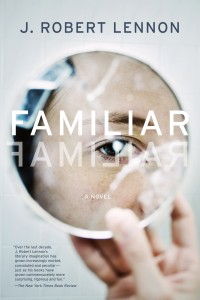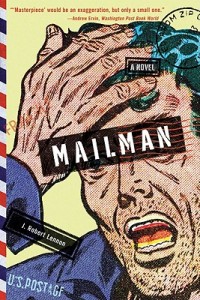The feeling creeps up on you sometimes, maybe on an unwelcome birthday or when the radiator clinks on in the middle of a sleepless winter night: This is not my life. You were different, once. Wanted something else. But now here you are. Stuck.
Such doubts have long been fertile ground for fiction. But J. Robert Lennon’s latest novel, Familiar, published by Graywolf last fall, attacks that uneasy feeling from an eerily literal angle: Elisa Brown is driving across Ohio on I-90 when suddenly her cutoff jeans are a skirt, her Honda becomes a Dodge Intrepid, and there’s a piece of mint gum in her mouth that wasn’t there before. This is definitely not her life. Now what? As Elisa struggles to find her way in this new alternate universe, Lennon’s tight, gripping book delivers gut-wrenching parenting nightmares, midlife crisis mediations, and a sci-fi thriller, all kicking along together like the best Twilight Zone episode you’ve ever read.
Unlike Elisa, Lennon himself seems to have things enviably put together. Familiar is his seventh novel in the last fifteen years. There’s also a collection of 100 very short stories, Pieces for the Left Hand (Graywolf, 2009). His short stories have appeared in the New Yorker, Harper’s, Playboy, Granta, the Paris Review, and Electric Literature, and his story “The Rememberer” inspired the CBS detective series Unforgettable. He’s put out four albums and an EP under the solo recording project Inverse Room, and currently gigs around the Finger Lakes with his new group, the Starry Mountain Sweetheart Band. His book reviews have appeared in the New York Times Book Review, the Guardian, and the London Review of Books. He’s also a photographer. He tweets aplenty, hosts the Lunch Box podcast with poet Ed Skoog, and recently found time to blog about a vacation to Scotland with his wife, the novelist Rhian Ellis, and their two sons. Somewhere in there he also teaches creative writing at Cornell. We chatted by email in February about oversharing, life online, and the perils of writing from the gut.
Interview:
Dan Keane: Eight books in fifteen years, at least two bands, a weekly podcast, photography, book reviews, Cornell…where do you find the time?
J. Robert Lennon: When you put it that way, it does seem like a lot. I’m compulsive, I suppose, and not very good at relaxing. I generally need to be doing stuff all day long—making stuff, specifically. I’m just lucky that my work is such a pleasure.
As a small Montana city recovers from a plane crash in your first novel, The Light of Falling Stars, there’s a lovely moment when a woman waiting for a kidney transplant asks “…they’re gonna cut part of me out and put something else in? How can that work?” Fifteen years later, Familiar poses the question in much starker form. How has your own understanding of grief changed over the years?
I would never have thought to connect those two books! And I hadn’t realized my career at this stage was bookended by grief. In fact, my understanding of it is almost entirely imaginary—I’ve rarely felt it. I haven’t lost anyone close to me in a long time, and even then—my grandfather—it was expected and prepared for, after a long illness. And so I am terrified of it. I think most people in their forties have experienced much more grief than I have, and it has just been the luck of the draw that I haven’t had to, but sooner or later my luck will run out. I think I fear grief more than I fear death. Perhaps I’m using my fiction as a bulwark against it, as a way of preparing.
Familiar suggests to me that grief might be so terrifying because it’s a shock to our identity that we can’t control – a radical reconfiguration of the stories we tell ourselves, like the shift in universes Elisa experiences. At one point Silas, her resurrected son, argues that even trying to tell ourselves these stories is a “pointless exercise.” Silas emits such a fierce power in the book. How much of his viewpoint do you share?
Somebody asked me if I share his opinion in the bit where he’s being interviewed about video games, and he questions the importance of narrative, and says, “People don’t know what they want. I do.” I kind of agree with him there. I just try not to be a dick about it! Silas holds a lot of my opinions, but he holds them like weapons, instead of like suggestions, if that makes sense. As for the idea of stories as a pointless exercise…well…maybe. But aren’t most of life’s greatest pleasures pointless? Art doesn’t need to be for anything, it just has to be. That’s what’s so beautiful about it.
 You’ve said the inspiration for Familiar comes from the countrywide-shock you sensed during a road trip you took right after 9/11, but that the book didn’t come to life until after you became a parent yourself—after you own life story had changed considerably. How has raising your sons affected the questions you’re interested in tackling with your work?
You’ve said the inspiration for Familiar comes from the countrywide-shock you sensed during a road trip you took right after 9/11, but that the book didn’t come to life until after you became a parent yourself—after you own life story had changed considerably. How has raising your sons affected the questions you’re interested in tackling with your work?
Hmm, well, this book is sort of an answer. I tried to write some spooky literary sci-fi and instead managed to produce a domestic drama about parenting. I don’t think consciously about parenting enough, probably—much of my relationships with my kids consists of benign neglect, mixed with trading mp3’s, talking about videogames, and making puns. I think I am probably ineffective at it, ultimately. But it raises questions, mostly about how we become who we are, that I can’t ignore. I don’t think you need to have kids to answer these kinds of questions, but in my case, it has had an effect.
Both Falling Stars and Familiar explore the heartbreak of a failing marriage. Can you talk about your approach to writing scenes where some of the most important thoughts are left unsaid by the characters involved?
In my actual life, there aren’t many important thoughts that go unsaid. I’m an oversharer, I’m afraid. So it was a challenge for me to learn what should and shouldn’t be said, either by the characters, or by my narrators. Familiar was an experiment in narrative spareness, actually, at least in the first draft. It’s the only novel I’ve written by leaving everything unsaid, then gradually adding what was needed, as opposed to the others, where I wrote too much and then cut. I don’t really remember what writing Falling Stars was like—I was twenty-five—but in the first draft of Familiar I tried, quite consciously, to avoid any descriptions of emotion at all, to convey everything through characters’ actions. It didn’t work, but it served as a good starting point for a novel that would.
Grief and heartbreak are two of those emotions writerly folks might say were “written from the heart,” or from the gut, or Lorca’s duende. But you have a great rant on your blog against such terminology as “rank sentimentality.” Why do you feel so strongly about it?
Indeed, I never shut up about it! So little of good writing, at least for me, comes from raw emotion or sudden inspiration. Most of it comes from persistence. Slogging, really. It’s effortful but interesting, and I love doing it, but I never want students to think they’re going to spend their lives writing killer first drafts. Perhaps a few of them will, what do I know—but in my experience, your gut is a liar. Like George Bush’s was when he thought he could see into Putin’s soul.
You’ve said your own flights of inspiration are “kinda bullshit most of the time” and that you trust more and more in the hard work of revision. Can you give an example of some dubious inspiration that revision ultimately saved you from?
 The part of my novel Mailman I enjoyed writing the most was this bit where the protagonist goes to the movies and keeps switching theaters, watching short excerpts of every movie in the multiplex. And I described all these fake movie scenes—I spent the better part of a week just making up fake movies and describing them in long, ridiculous paragraphs. It was so much fun. But my editor wisely cut it. There was no point to it—it didn’t serve the book in any way. It only served my desire to create it!
The part of my novel Mailman I enjoyed writing the most was this bit where the protagonist goes to the movies and keeps switching theaters, watching short excerpts of every movie in the multiplex. And I described all these fake movie scenes—I spent the better part of a week just making up fake movies and describing them in long, ridiculous paragraphs. It was so much fun. But my editor wisely cut it. There was no point to it—it didn’t serve the book in any way. It only served my desire to create it!
Your fictional worlds sometimes leave deliciously spooky questions of physics shrouded in mystery—Familiar’s potential multiverse, the trackless woods of Castle. How much uncertainty can a writer get away with?
“Get away with” is kind of a tricky turn of phrase. What’s the metric for having gotten away with something? The older I get (unless I am reading a science fiction novel, where the concept is king), the less I really want to know what’s going on. I want to experience a very rich unknowing. And so my own writing has been moving in that direction as well. I admire the audacity of novels like Tom McCarthy’s Remainder or Kathryn Davis’s Hell or Kazuo Ishiguro’s The Unconsoled, where you are never entirely sure what’s going on. These books are more like music than most fiction is—concerned more with the recapitulation and reexamination of themes and motifs than a tight and satisfying narrative arc. I suppose the metric in question is, “…or you’ll never be a bestselling author,” and that is fine by me. Once we get to “…or nobody will publish you anymore,” I guess I’ll have to reconsider.
Familiar accompanies Elisa’s doubts about her identity with lots of thematic imagery—cracked windows, a cell dividing, and a building that folds back on itself, among others. Where in your process do these moments begin to appear? What’s too much? What’s not enough?
The cracks—which Elisa sees everywhere once a crack in a car windshield heralds the sudden change in her existence—were intentional parts of the first draft of the book. The building folding in on itself was an accident—a casual description of setting that suddenly announced itself as a metaphor. The dividing cell was a late addition, when I realized that more of Elisa’s consciousness should draw from her self-identification as a scientist. So, these things appear at all stages. I try to write first drafts fast these days, which is a good way, for me anyhow, to tap into whatever my subconscious is up to. A lot of what results is crap, but some of it is interesting, and I try to tease those threads out in later drafts. And once I know what the most important themes, images, and ideas are, I begin to massage them, judicously I hope, throughout the manuscript. I really don’t know what is enough and what is too much, but given my predilections, I generally assume I’ve done too much, most of the time.
I loved the author photo on the back of Familiar: instead of the writer’s traditional modeling headshot, it’s you in the middle of a lecture. How would you describe the relationship between your writing self and teaching self?
Actually, my friend Lindsay took that picture at a reading I was giving in somebody’s living room! But I do look rather professorial in it, I guess—perhaps that’s how I want to see myself these days? Anyway, philosophically speaking, my writing and teaching selves are quite united. I don’t write much during the semester, but that’s mostly because I don’t have time. I love my students and find my conversations with them really satisfying. The younger ones make me reexamine my assumptions, and the more seasoned ones challenge me as peers. I get paid to talk to people about books all day, basically. It’s great.
In your much-discussed manifesto on writing bad reviews, you suggested writers can be “a booster on social media and a critic elsewhere—on blogs and in newspapers.” This echoes Elisa Brown’s divided life—the Internet as a web of parallel universes in which we constantly reinvent ourselves. You seem quite at ease moving through these different worlds. As writers, is it desirable, or even possible, to keep our various online and offline lives distinct? Or are we, like Elisa, eventually forced to meld them into one?
When I said that, I was responding to an article someone had written about writers being too nice to one another on twitter, something I don’t regard as a problem. Twitter is like a cocktail party for most writers—it’s more about mingling and being witty than about criticism. But the fact that I’m willing to horse around with friends on twitter, or post photos of my cat or the food I’m cooking, doesn’t mean I’m going to be less than absolutely serious when somebody is paying me to review a book. These mediums are culturally different and allow for different kinds of etiquette. For instance, my friend just published a poetry collection, and I have been encouraging people to buy it on Twitter and Facebook. This isn’t disingenuous—it’s a great book, and I love her writing. But she is my friend, and I make people aware of this fact. If, however, the Times or another paper asked me to review it, of course I would say no, I can’t, she’s my friend, there’s a conflict of interest.
Every medium has a different mode of engagement, in other words. But the rules are always changing, and different people believe in different sets of rules. There are many Twitterverses, I’m sure, with different expectations and allowances. So I think it’s useful for us to hash this out regularly. I’ve had discussions, conflicts even, with acquaintances who approach these mediums differently from me—bloggers who will review friends online without saying that they’re friends, for instance. A lot of casual critics live in that middle zone between book promotion and criticism, and that place freaks me out. One has to be judicious about where to spend one’s capital. Because a book reviewer who gets paid is getting paid, in part, for their integrity.
And frankly, this matters for my teaching, too. If some of my students know that I say off-color or goofy things on Twitter and find it amusing that a professor of theirs acts this way in public, then fine—I like being that guy. But they also know that, in the classroom, even though my demeanor may be casual and unedited, my professional ethics are sound. I make sure they know it. I take their work seriously, and their personal lives, too, if occasionally they take me into their confidence, as sometimes happens with creative writing students. Here, as on the Internet, the professional and personal are not separate—they can’t be. But we need to make rules, maintain them, and adjust them as we go, so that our intentions are clear, and the people whose trust we need—our readers and students—can give it to us.
That’s a rather long-winded answer to your question. The short version is: like Elisa, I’ve melded them into one. But I’m sympathetic to those writers who keep away from this stuff entirely. It’s exhausting sometimes.
Further Links and Resources:
- Read J. Robert Lennon’s rules for writing bad reviews, from Salon.
- Check out J. Robert Lennon’s “Warning: Do Not Write From Liver.”
- Sample some of the 100 songs written for Pieces For Left Hand.
- You can also listen to J. Robert Lennon covering Cyndi Lauper’s “Girls Just Wanna Have Fun.”
- Finally, visit the author’s website for news, further writing, his blog, and links to his other projects.







